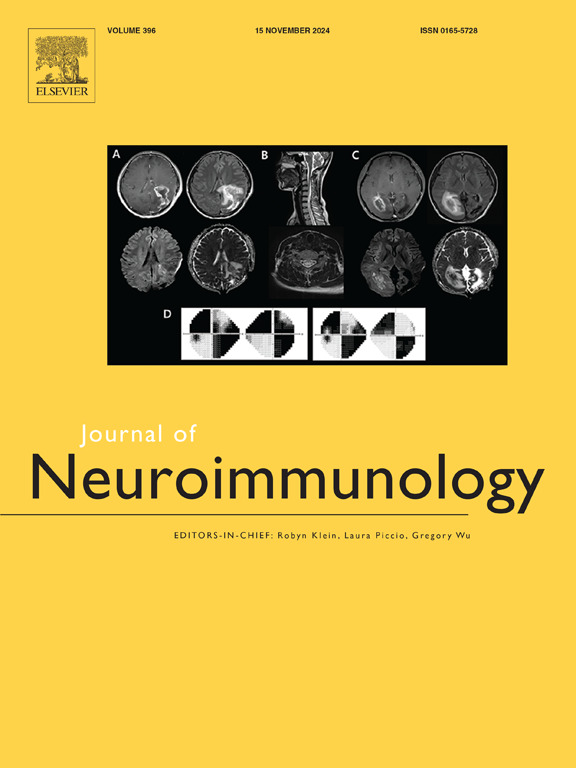Relapsing-remitting multiple sclerosis as a potential consequence of thalidomide treatment: A case report
IF 2.5
4区 医学
Q3 IMMUNOLOGY
引用次数: 0
Abstract
We present the first reported case of central nervous system (CNS) demyelination associated with thalidomide. A 29-year-old female with a history of prurigo nodularis was prescribed thalidomide after the failure of other therapies. Three weeks later, she developed right hemiparesis and sensory disturbances in the right upper and lower extremities. Brain and spinal cord MRI showed hyperintense and gadolinium enhanced lesions. She was diagnosed with clinically isolated syndrome and treated with IV pulses of methylprednisolone with full recovery. Due to suspected association between her symptoms and thalidomide, the drug was discontinued. Three years later she returned to our Outpatient Clinic after being treated at another hospital for a new attack, characterized by muscle weakness and sensory disturbance in the lower limbs. Brain and spinal cord MRI showed new lesions, fulfilling the criteria for multiple sclerosis. We believe the association between thalidomide and CNS demyelination may be due to its tumor necrosis factor-α (TNF-α) inhibition effect. Biologic TNF-α inhibitors have been reported to cause CNS lesions, with cases of optic neuritis, transverse myelitis, multiple sclerosis, and neuromyelitis optica spectrum disorder developing after initiation of drugs such as etanercept, adalimumab, infliximab and golimumab. This report shows that thalidomide should be considered a potential cause of CNS demyelination, similar to biologic TNF-α inhibitors, and should be avoided in patients with a heightened risk.
复发缓解多发性硬化症作为沙利度胺治疗的潜在后果:一个病例报告
我们提出了首例报道的中枢神经系统(CNS)脱髓鞘与沙利度胺。一名29岁女性,既往有结节性痒疹病史,在其他治疗无效后给予沙利度胺治疗。三周后,患者出现右半瘫及右上、下肢感觉障碍。脑和脊髓MRI显示高信号和钆增强病变。她被诊断为临床孤立综合征,并接受静脉注射甲基强的松龙治疗,完全康复。由于怀疑她的症状与沙利度胺有关,停药。三年后,她在另一家医院治疗了一次新的发作,以肌肉无力和下肢感觉障碍为特征,又回到了我们的门诊。脑和脊髓MRI显示新的病变,符合多发性硬化症的标准。我们认为沙利度胺与中枢神经系统脱髓鞘的关联可能是由于其抑制肿瘤坏死因子-α (TNF-α)的作用。据报道,生物TNF-α抑制剂可引起中枢神经系统病变,在开始使用依那西普、阿达木单抗、英夫利昔单抗和戈利单抗等药物后,会出现视神经炎、横贯脊髓炎、多发性硬化症和视神经脊髓炎频谱障碍。该报告显示,沙利度胺应被视为中枢神经系统脱髓鞘的潜在原因,类似于生物TNF-α抑制剂,应避免在高风险患者中使用。
本文章由计算机程序翻译,如有差异,请以英文原文为准。
求助全文
约1分钟内获得全文
求助全文
来源期刊

Journal of neuroimmunology
医学-免疫学
CiteScore
6.10
自引率
3.00%
发文量
154
审稿时长
37 days
期刊介绍:
The Journal of Neuroimmunology affords a forum for the publication of works applying immunologic methodology to the furtherance of the neurological sciences. Studies on all branches of the neurosciences, particularly fundamental and applied neurobiology, neurology, neuropathology, neurochemistry, neurovirology, neuroendocrinology, neuromuscular research, neuropharmacology and psychology, which involve either immunologic methodology (e.g. immunocytochemistry) or fundamental immunology (e.g. antibody and lymphocyte assays), are considered for publication.
 求助内容:
求助内容: 应助结果提醒方式:
应助结果提醒方式:


